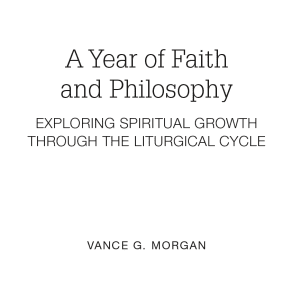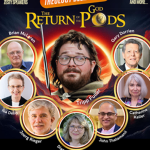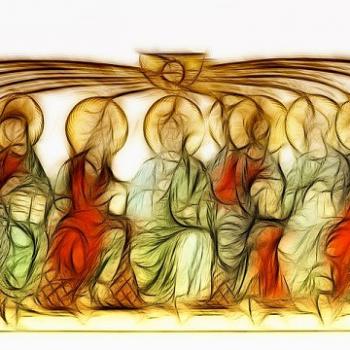
First, some big news! I received the page proofs of A Year of Faith and Philosophy a couple of days ago–they look great! One more time through, and the book will be essentially out of my hands until its publication early next October. It has been a labor of love–a long process that is close to completion.
This Sunday is the final Sunday of Ordinary Time–in a bit over a week we begin a brand new liturgical cycle. Here are some thoughts on what’s in store for us in the lectionary on Sunday.
Proper 29, the last Sunday of Ordinary Time, is “The Reign of Christ” Sunday. The gospel options vary considerably, including the sheep and goats passage in Matthew 25, Jesus’s trial before Pilate in John 18, and the crucifixion in Luke 23. Taken together, they provide a range of responses to Pilate’s question, “Are you a king?”
Perhaps the greatest confusion among those who heard and followed Jesus during his time on earth was directly related to Pilate’s question. For the people of an occupied land, it is no wonder that they had expected the Messiah to be a liberator. As the men on the road to Emmaus said, “We had hoped that he was the one to redeem Israel.” John and James ask if they might have the special favor of sitting on either side of his throne in his glory—it is clear that they are not thinking of some distant future. Two thousand years later, the notion of fusing religious belief with political power continues to be persistent and seductive.
Jesus responds to Pilate’s “Are you the king of the Jews?” as he often does by asking a question himself. “Do you ask this on your own, or did others tell you about me?” The first possibility means that Pilate is concerned about a threat to Caesar’s authority, while the second reveals Jesus’s suspicion that Pilate is being pressured by others, namely the Jewish religious authorities. In the complex politics of an occupied land, the Jewish authorities want Jesus gone, but need to convince the occupying Romans that it is in their best interest to convict and execute Jesus.
Once Pilate makes clear that it is the Jewish authorities that Jesus is in trouble with, Jesus puts his cards on the table.
My kingdom is not from this world. If my kingdom were from this world, my followers would be fighting to keep me from being handed over to the Jews. But as it is, my kingdom is not from here.
In other words, if I was the sort of king you are thinking about, we wouldn’t be having this conversation. But my kingdom is not about political power at all. There’s something completely different going on.
In the religious world of my youth we were consistently told that Christians are in this world but are not to be of this world. I took that to mean that we are stuck here in this physical way station for a certain amount of years until we get to go to heaven. In the meantime, don’t be seduced by anything your physical reality has to offer. This may have just been a product of my youth, but my sense was that the adults thought this way as well.
I always resisted this directive because I sort of liked this world. But Jesus’s teachings and parables about the Kingdom of heaven make clear that it is not something to be imagined in a projected future. Recall his metaphors about our roles in the Kingdom of heaven. We are salt, yeast, a mustard seed . . . all tiny, insignificant, embedded things that facilitate great change over time. The Kingdom of heaven changes everything from the inside rather than imposing change from the outside. We are in the world but not of the world because by being followers of Jesus, we are agents of change in the world.
Remember the ruler in Kierkegaard’s story of the king and the maiden. He makes a true relationship with the maiden possible not through an expression of his power, but by voluntarily setting that power aside in humility and becoming as she is. That is the kind of king that Jesus is and what the Spirit inspires in us, as Paul captures in this passage from Philippians:
Who, though he was in the form of God
Did not regard equality with God as something to be exploited,
But emptied himself, taking the form of a slave,
Being born in human likeness.
And being found in human form, he humbled himself
And became obedient to the point of death—
Even death on a cross.
The passage closes with a description of an exalted Son, tying together the humble and royal aspects of kingship.
Therefore God also highly exalted him and gave him the name
That is above every name,
So that at the name of Jesus every knee should bend
In heaven and on earth and under the earth
And every tongue should confess that Jesus Christ is Lord.
For reflection: Which metaphor is more meaningful in your faith journey, the exalted Jesus or the servant Jesus?













